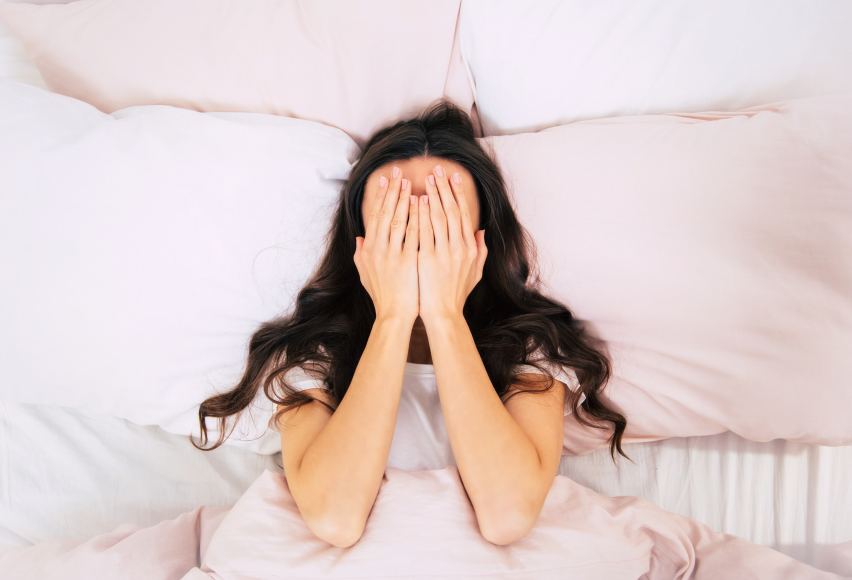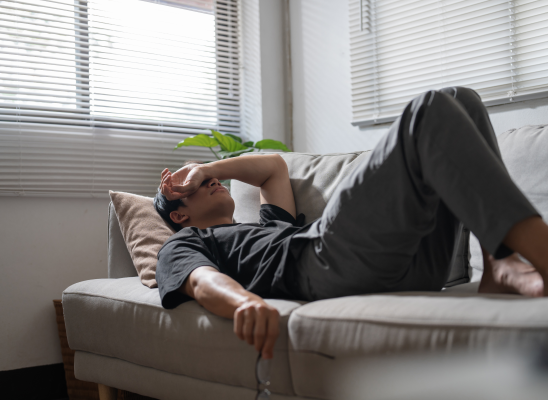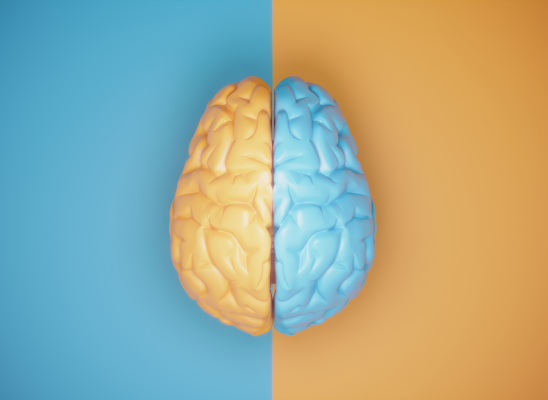
Online test
Find out the severity of your symptoms with this free online test
If you live with Obsessive Compulsive Disorder (OCD), you already know how relentless the cycle of obsessions and compulsions can be. But what’s often overlooked is how much OCD can interfere with sleep. Good restorative sleep is something we all need to function at our best.
In fact, nearly half of people with OCD report trouble falling asleep, staying asleep, or waking up feeling unrested, even when they’ve slept for several hours. You would think that being tired and sleepy would calm the mind. But often, those obsessive and intrusive thoughts just won’t settle down, making getting a good night’s sleep seem impossible. It can be frustrating, exhausting, and overwhelming.
How Obsessions Impact Sleep
OCD is marked by unwanted, intrusive thoughts (obsessions) and repetitive behaviors or mental rituals (compulsions) performed to ease the anxiety and distress created by those thoughts. They don’t happen on a schedule and can arise any time. Bedtime is the perfect time for those unwanted thoughts to creep in. The day is coming to an end, things are settling down and the mind is quiet leaving more opportunity to ruminate. Without external noise or distraction to drown them out, those intrusive thoughts can become louder, more persistent, and harder to escape.
But just how do obsessions contribute to poor sleep?
Bedtime Becomes a Trigger
For many people with OCD, nighttime routines become tangled with compulsions. Whether it's checking and rechecking locks, replaying conversations, repeating prayers, or needing to perform a ritual “just right” before bed, these behaviors can delay sleep and increase stress.
Rumination at Night
Simply lying quietly in bed can bring on a wave of obsessive thoughts. Depending on your type of OCD, you might replay the day over and over, looking for some moral mistake or social faux pas, you might worry excessively about the future, or you might take a deep dive into your fears (e.g., contamination or harm). These mental gymnastics keep your brain awake and anxious.
Heightened Arousal System
OCD increases activity in the areas of the brain responsible for threat detection and response. This keeps your arousal system engaged and ready to respond, making it difficult to relax. And a brain that’s on high alert is not a brain that’s ready for sleep.
Circadian Disruption
Some people with OCD experience a sleep problem known as Delayed Sleep Phase Syndrome (DSPS). DSPS is a circadian rhythm disorder where a person’s sleep is shifted later by two or more hours, causing them to fall asleep later than a common bedtime. Research has found that about 42% of people with OCD experience DSPS. This can be especially problematic for those who engage in nighttime rituals or experience racing thoughts.
Why Sleep Matters When You Have OCD
Poor sleep doesn’t just leave you feeling tired. A lack of good quality sleep can actually make your OCD symptoms worse. Sleep deprivation increases emotional reactivity, lowers your ability to manage stress, and impairs concentration. When you're exhausted, it’s harder to cope with intrusive thoughts in a healthy way and resisting compulsions becomes even harder.
It’s a double-edged sword: OCD affects sleep. Poor sleep worsens OCD symptoms.
So, what can you do to get a better night’s sleep when your OCD wants to keep you awake?
Practice good sleep hygiene.
Practical Tips for Better Sleep
Improving sleep hygiene can help you get a better night’s sleep and may even help you to better manage your OCD symptoms too. Sleep hygiene refers to the habits, behaviors and environmental factors that you can control to help improve your sleep quality.
Getting better sleep when you have OCD means tackling both general sleep hygiene and obstacles specific to your OCD. Try some of these practical strategies for getting a better night’s sleep:
Create a Predictable Wind-Down Routine
Our bodies thrive on rhythm and consistency. A predictable, consistent wind-down routine signals to your brain that it’s time to start preparing for sleep. Try to go to bed and wake up at the same time every day, even on weekends. About 30-60 minutes before bed, start preparing for sleep. Keep it simple: dim the lights, turn off screens, do something calming (like reading, gentle stretching, or listening to soothing music).
As your brain is trying to settle in, your OCD may try to hijack your routine with perfectionism or rituals. Remember, consistency over perfection. Let your routine be “good enough”.
Limit Rituals in the Bedroom
While it may be hard to do 100%, try to keep compulsions outside the bedroom as much as possible. Your bedroom should be a place of solace and offer a mental cue for rest, not anxiety. If you catch yourself stuck in rituals like checking or mental reviewing before bed, gently redirect your focus and remind yourself that giving into compulsions will only delay rest.
Use the 15-Minute Rule
This is a tried and true practice that can help you refocus on sleep. If you're lying awake for more than 15-20 minutes, don’t just stay in bed with those obsessive thoughts spinning in your head. Get up and do something quiet and calming, like sitting in another room reading a book or listening to soothing music. Go back to being when you feel sleepy again. When your brain is especially active, you might have to try this a few times and that’s ok. This practice helps train your brain to associate bed with sleep, not anxiety or frustration.
Practice Acceptance
It’s not unusual for intrusive thoughts to intensify at night. The key is to not fight them. You don’t need to do anything about them at that moment. That might sound counterintuitive because after all, you’re trying to get to sleep.
Instead, practice acceptance. Practice noticing the thought, acknowledging it – “Oh, OK, there’s my OCD again”, and redirect your attention to something else in the moment. For example, instead of focusing on your thoughts, focus on your breath. This mindful awareness takes some practice, but it is a key skill in managing your OCD and in getting a better night’s sleep too.
Watch Out for Sleep Stealers
Little things we do every day that might not seem connected to sleep can have a big impact. Be on the lookout for these sneaky sleep stealers:
- Screens – Yes reading before bed might help you sleep but that blue light from the screen might be undermining your sleep. Blue light from phones and TVs can suppress sleep hormone melatonin.
- Caffeine – Some people are especially sensitive to the effects of caffeine, especially late in the day. Try to avoid that afternoon pick-me-up and see whether your sleep improves.
- Naps – Who doesn’t love a good nap? But naps, especially long or late ones, can disrupt the sleep cycle. If you must nap, try to limit it to 20 minutes or to early in the day.
When Self-help Isn’t Enough
Sometimes, no matter how hard you try, you just can’t get your OCD and your sleep to play well together. That’s the time when therapy can really help.
While OCD and insomnia or sleep problems are unique issues, there is some overlap in how they can be treated making it especially useful for someone who has both.
Cognitive Behavioral Therapy for Insomnia (CBT-I)
CBT-I is a specialized, evidence-based type of CBT that helps people learn to reset their sleep patterns without medication. It works by targeting the thoughts and behaviors that interfere with sleep. Studies have found that it can be particularly effective for individuals with OCD who are experiencing sleep difficulties.
Medication
For some people, medication such as a selective serotonin reuptake inhibitor (SSRI) may be helpful in reducing OCD symptoms which may in turn, help to foster more restful sleep. Other medications or sleep aids may also be beneficial too. It’s a conversation to have with your healthcare provider in order to determine whether medication can help.
Exposure and Response Prevention (ERP) Therapy
ERP is a specialized form of CBT and is considered the “gold standard” in treating OCD. It involves gradually facing your obsessions without doing the usual compulsion. Over time, this retrains the brain to stop reacting with alarm. If OCD is fueling your sleep struggles (e.g., needing to check things repeatedly, or being stuck in “what if” thinking), ERP can help break those patterns.
Putting It All Together
If you have OCD and sleep has been elusive, you’re not alone. With time and patience, and maybe some professional help, you can overcome your sleepless nights and find restful sleep again. It may take a few weeks of consistent practice before you see real improvements. That’s okay. Change takes time and persistence.
With practical tools, targeted therapy like CBT-I and ERP, and consistent routines, better sleep is possible.
If your OCD is keeping you awake, help is available. At StopOCD.com, we have a team of expert therapists ready to help you reclaim your good night’s sleep and find healthy ways to manage your OCD. And online therapy makes getting help easy, secure, and comfortable. A good night’s sleep is waiting for you.
References
1. Paterson, J. L., Reynolds, A. C., Ferguson, S. A., & Dawson, D. (2013). Sleep and obsessive-compulsive disorder (OCD). Sleep medicine reviews, 17(6), 465–474. https://pubmed.ncbi.nlm.nih.gov/23499210/
2. Segalàs, C., Labad, J., Salvat-Pujol, N. et al. (2021). Sleep disturbances in obsessive-compulsive disorder: influence of depression symptoms and trait anxiety. BMC Psychiatry 21, 42. https://bmcpsychiatry.biomedcentral.com/articles/10.1186/s12888-021-03038-z
3. Suni, E. (2023, September 1). Mastering sleep hygiene: Your path to quality sleep. Sleep Foundation. https://www.sleepfoundation.org/sleep-hygiene
4. Smith, M. T., Huang, M. I., & Manber, R. (2005). Cognitive behavior therapy for chronic insomnia occurring within the context of medical and psychiatric disorders. Clinical Psychology Review, 25(5), 559-592. https://www.sciencedirect.com/science/article/abs/pii/S0272735805000309
5. Kellner M. (2010). Drug treatment of obsessive-compulsive disorder. Dialogues in clinical neuroscience, 12(2), 187–197. https://pmc.ncbi.nlm.nih.gov/articles/PMC3181958/
Online test
Find out the severity of your symptoms with this free online test
Start your journey with StopOCD
Take control of your life and find freedom from OCD through professional therapy and evidence-based cognitive behavioral techniques.
Start Now



